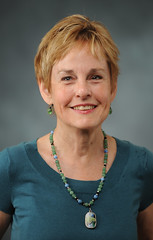
From Carta Marina
December 16
Red taillights lead me uphill, downhill—Ann Fisher-Wirth agreed to an interview with myself and 32 Poems. And here is what she had to say.
I watch them from the bus’s steamy window,
pressing my cheek against cold glass
as I’m carried from the airport past fields and factories,
past Märsta in the midnight
where the old men still hunt elk-moose
till bloody haunches fill their freezers.
It’s not this man or this man, not
these golden daughters or this dream-ravened swaddle:
no, it’s the doors closed or the doors opened,
it’s the heart gone night. The gods
stream back and forth across the threshold.
You can ride it, you know,
get on the dark bus and let it carry you.
That’s how I’ve always been, going home, going nowhere—
uphill, downhill, the taillights like rubies,
past fields where the trees are just darker effacings.
How would you introduce yourself to a crowded room eager to hang on your every word? Are you just a poet, what else should people know about you?
I’d never say anyone was “just” a poet, because a poet is a pretty amazing thing to be. But writing poetry is not the only thing I do. I teach American literature, poetry workshops and literature courses, and a wide range of courses in environmental studies at the University of Mississippi.
I also teach yoga, and that is a really important part of my life. I’ve been married for nearly 26 years to Peter Wirth. We have five grown children—mine, his, and ours—and rapidly expanding numbers of grandchildren. We live in a very cool old Victorian house with two huge pecan trees in front of it, in Oxford, Mississippi.
I’ve lived in the South for almost 30 years, but I grew up first as an Army brat all over the world, and then in Berkeley, California, so I love to travel and hold many places in my heart.
Do you have any obsessions that you would like to share?
Environmental issues and consciousness-raising are my obsession. Truly they are. I am convinced from everything I’ve read that we have very little time left before we reach a catastrophic tipping point for life on earth. We may already be there.
One helpful book is Lester R. Brown’s Plan B 3.0: Mobilizing to Save Civilization, which can be downloaded free from the Earth Policy website, and which fully documents how desperate a situation we humans have created environmentally, and how thorough-going and rapid our response must be—far beyond anything now being considered by those in power.
In terms of friendships, have your friendships changed since you began focusing on writing? Are there more writers among your friends or have your relationships remained the same?
It’s true, most of my friends are writers, and if they are not writers they are professors. I have gotten to know hundreds of writers since I began focusing on writing, and some of them have become wonderful friends.
I’m also very close to a number of people I know through the Association for the Study of Literature and Environment—again, writers and academics. But how could I escape it? My mother was a teacher, my sisters, brother-in-law, husband, and two of our five children are all teachers. It’s a great way to live.
If you've enjoyed Ann's answers so far, I suggest you check out the rest of my interview with her over at 32 Poems Blog. Once there, you can find out about her workspace, her inspirations, and much more. Feel free to leave me comments and discuss Ann's work (sampled above), her interview, or your thoughts on poetry in general.
















1 comments:
Interesting interview, and I will check out the rest in a sec.
I really like the description "taillights like rubies" in the poem.
--Anna
Diary of an Eccentric
Post a Comment